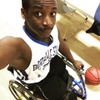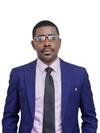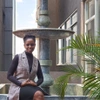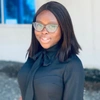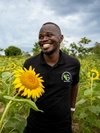Amos Kwizera
There is Nothing Like Impossibility

Tales of Courage is a series that speaks about the power of education as a tool for transformative change in the world. They are told through the lens of Mastercard Foundation Scholars and Alumni. Here is Amos’s story
Amos Kwizera became a refugee at the age of four when he and his family fled the war in his home country, Congo. They moved from place to place for two years in search of peace.
They finally resettled in Kyangwali, the bushy, remote refugee camp in Uganda where refugees were regularly left at the mercy of monkeys, baboons and other animals. According to the 2022 UNCHR report, the Kyangwali refugee camp accommodates 125,786 refugees. Amos has been in the refugee camp for about two decades.
However, the challenges for Amos and his family did not end there. His sister was diagnosed with malaria and denied the necessary treatment, ultimately leading to her passing. It was a massive blow to Amos, who felt it was due to discrimination for being a refugee. This inspired him to work with fellow refugees to ensure others did not suffer the same fate and had access to life-saving support.
“When someone comes from their country, and we go to the refugee camp where you can’t access education, there is no future. There’s nothing else you think about apart from problems.”
I've been working with my friends to make sure we have a better life.
Amos’s desire to provide hope and opportunities for refugees led to his involvement with COBURWAS International Youth Organization to Transform Africa, which aims to provide access to quality education for refugees and people affected by conflict and train young people in entrepreneurial leadership to become peacebuilders in their own countries.
Amos also continued his quest to make a difference in the lives of refugees through education. He joined the Mastercard Foundation Scholars Program at the African Leadership Academy (ALA), after which he enrolled as a Scholar at the United States International University-Africa (USIU-A) in Nairobi. Amos continued to work with refugees during his undergraduate studies and soon realized that he wanted to build a career doing the same. He then started looking for colleges that would allow him to pursue a career in human rights, and he came across the Mastercard Foundation Scholars Program at Sciences Po in Paris. The robust and holistic training in human rights and the support Amos received thus far as a Scholar at USIU-A and ALA left no doubt in his mind that Sciences Po was the perfect fit.
“The day I got accepted at Sciences Po, it was…I don’t know how to describe it, but I was super joyful. My mom, who didn’t get a chance to go to school, was also happy when she heard that I was going to school because I used to tell her I must do human rights and humanitarian action, something she doesn’t even understand.”
Upon arriving in France, Amos was introduced to Mastercard Foundation Program Managers at Sciences Po, alumni, and fellow Scholars. He found solace in this new community at Science Po and settled in quickly.
“Transitioning from work to Sciences Po is a joyful journey because I’m doing something I wanted to do. Meeting professors who are wonderful, supporting and willing to work with me throughout my journey of creating policies that will enable refugees to have access to the good life and education and other opportunities. So the transition from work to school, again, is very small.”
Amos now feels ready for his future because of Sciences Po’s preparation. He studies Migration and Human Rights, and both courses align with his plans. He remains passionate about advocating for refugees and hopes to help create policies that will give refugees access to education, work, and other rights. He recently won an impact award that will support a venture he started at the Kyangwali refugee camp, which aims to train women to grow vegetables using goat manure. The produce they grow will be sold to pay the school fees of children in the camp and contribute to the community’s overall economic empowerment.
A refugee person is a human being like any other person. The only difference is the label given to that individual “refugee” which should not be a basis for discrimination when it comes to opportunities, [and] services among others. So respect human beings. If you respect human beings, then you should also respect refugees because they’re human beings like any other person.
